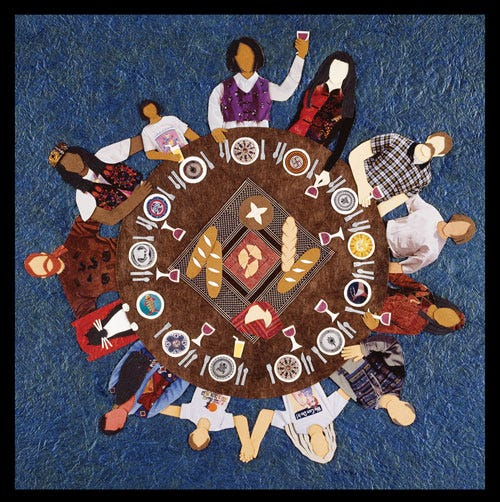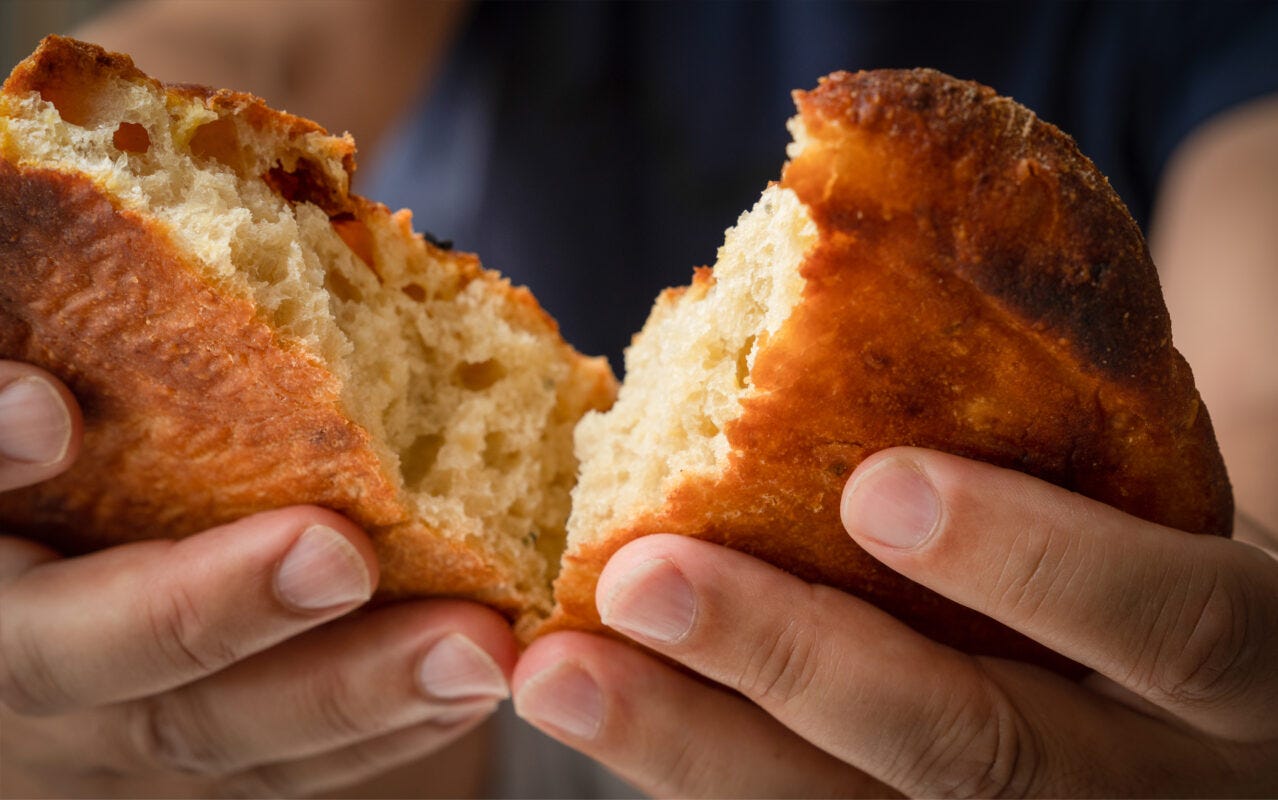Dear Friends,
I want to talk about the Table today.
I was raised with intense respect for the particular rules of the Eucharistic table. Baptized into an ELCA community with one faithfully practicing parent and another lapsed Catholic, the notion of First Communion was both less elaborate than the Catholic vision with its white gowns and tiny veils, with that first confession, and also more serious in a way – we were in fifth grade and had to wait so very long, it seemed. I was eleven when I was first invited to come close to the Eucharistic mysteries in that way.
I was much younger, though, when it was communicated that in other churches, I was not invited at all. And I distinctly remember how that felt. How unwanted and unwelcome and confused.

I am not here to debate the canons around baptism and communion or why communion is a denominationally closed practice in the Roman Catholic Church, as opposed to the wider, table generally found in Protestant traditions. Whatever I think of them, those things will always be the imperfect expressions of humans.
All of this leads me to this Sunday’s Gospel reading and some scandalized disciples:
John said to Jesus, “Teacher, we saw someone casting out demons in your name, and we tried to stop him, because he was not following us.” But Jesus said, “Do not stop him; for no one who does a deed of power in my name will be able soon afterward to speak evil of me. Whoever is not against us is for us. For truly I tell you, whoever gives you a cup of water to drink because you bear the name of Christ will by no means lose the reward.” (Mark 9:38-41)
Let The Children Come
One of my favorite things that I get to do in worship, at least on our best weeks (when I’m on time bringing my class back from Church School, when the kids are sufficiently settled and willing), is to bring the children up to the altar during the Liturgy of the Table. I have step stools that we keep at the altar so that the smallest children can see over the table. We sing the Sanctus (the Angels’ song, I always say), and draw our attention to how the priest bows, how the gifts are shown to everyone because they are the Gifts of God for the People of God. I often think to myself that I have the best job in the world, and each time I guide the children during this part of service, I am struck by that feeling. What great fortune.
Of course, sometimes I worry retroactively. In particular, what if I take visiting or new children up and they receive communion but they aren’t baptized or their parents are ready for them to do that yet? Will I have upset someone? Will they decide not to come back?
And at the same time, what is the worst that can happen? Already we recognize the image, the name of Christ in each person. Just as this week’s Gospel reading observes that the person who, though not a follower, does acts of power in the name of Christ, will never speak ill of Jesus after, the worst outcome is a disappointed adult. But it may also mean a child who feels welcomed and loved and invited to the mystery that is so great we are all continually reaching for it and coming up short in wonder.
Sunday October 6th, 2024 – if you’re not having a big Feast of Saint Francis shindig – is World Communion Sunday. And, in a world marked by divisions, I am struck by unique ecumenical celebration. It is an opportunity for us to envision community beyond our parishes and neighborhoods, beyond our denominations and traditions, and to recognize our belonging to a global family in Christ.
As we say in the Anglican tradition, “Though we are many, we are one body, because we all share in one bread.”
So, who are you inviting to the table?
Exploring The Heart of World Communion
What do you believe about the Eucharist?
This is my question to you, and from there, I wonder, what are you communicating about it to others, particularly to the children in your life?
Maybe you need to go back. To spend some time thinking about what the Eucharist is –
What does your own tradition say about Eucharist? How is it like what your neighbors believe? For example, Eucharistic adoration is fairly antithetical to Episcopal eucharistic theology, but how does it strike you personally? Why might someone do it? What might attending to a different denomination’s approach to communion teach us about our own?
Do you offer communion education? Engage in instructed eucharist regularly? Do you have resources regularly available for people who are wondering about what the different parts of this sacrament mean and why we do them?
And, maybe, none of it matters if ultimately there is intimacy with God.
Resource Round-Up
I got to write a really fun post about Godly Play DIYs for Grow Christians this past week. Institutionally, Godly Play is making a lot of moves to support more widespread access to materials, and part of that is creating financially attainable options for communities across the economic spectrum, without significantly compromising on quality.
This post from Meredith Miller about avoiding “school language” when asking about children’s experience of Sunday School is such a great one. As someone who is often flummoxed when people ask about what children should “know” by certain points in their church school education, staying in the space of story to begin with feels healthier and less fraught.
Looking ahead to Advent, Chalice Press has a great write-up on why they’re publishing two Advent devotionals this year – one specifically for African-American congregations focused on sacred and seasonal music and another on the daring adventure of Advent, of Christ being sent into the world and of how we can put ourselves out there in the name of connection.
I know we did St. Francis next week, but if you’re still wrangling resources there, don’t forget about the free sample lesson from Holy Troublemakers and Unconventional Saints, as well as my favorite picture book version of the traditional hymn All Things Bright & Beautiful.
Peace be with you all this week. Fall is finally on the air here and I am relishing this shifting season –
Bird




